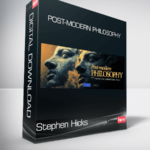🎈 Happy New Year 2025!
Use code HAPPY2025 to get 30% OFF on all products!
Limited-time offer. Don't miss out!
Peterson Academy – Stephen Hicks – Post-modern Philosophy
Original price was: $499.99.$89.00Current price is: $89.00.
Delves into the emergence of critical feminist and race theories, as well as the development of objective approaches to ethics…
File Size: 8.030 GB.
Format File: 8 MP4, 8 SRT, 9 TXT.
- Description
- Reviews (0)
Description
Peterson Academy – Stephen Hicks – Post-modern Philosophy

In Postmodern Philosophy, a nine-hour course, Dr. Stephen Hicks takes us on an exploration of the evolution of 20th-century philosophy, from the pragmatism of Dewey and Russell to the postmodern ideas of Foucault and Derrida. We examine how philosophers responded to the major events and challenges of the era, such as World War I, World War II, and the Holocaust, and how their ideas shaped political ideologies and global conflicts. The course also delves into the emergence of critical feminist and race theories, as well as the development of objective approaches to ethics and the debate surrounding the objectivity of science. Ultimately, we establish the profound influence of philosophy on history, demonstrating how philosophical ideas have the power to transform society and shape the course of human progress.
Lectures
1. Uncertain Prospects
In our introductory lecture, we are presented with the state of philosophy at the turn of the 20th century, as exemplified by the contrasting yet complementary views of Bertrand Russell and John Dewey. Russell argues that philosophy’s value lies in its uncertainty, enlarging our thoughts and freeing us from the tyranny of custom, while Dewey emphasizes the need for a pragmatic approach that moves away from fixed, eternal truths and embraces the evolving, changing nature of reality as revealed by Darwin’s theory of evolution. Dr. Hicks highlights the shared skepticism of both philosophers regarding philosophy’s ability to provide definitive answers, marking a significant shift in the discipline’s trajectory.
2. The Analysts of the Self
In lecture two, we examine the philosophical responses to World War I, focusing on the works of Sigmund Freud and Martin Heidegger. Freud’s “Civilization and Its Discontents” argues that human nature is fundamentally aggressive and destructive, with civilization serving as a necessary illusion to manage these instincts. Heidegger, in “What is Metaphysics?”, proposes that the war signals the end of a 2,000-year philosophical tradition and that we must embrace emotions like anxiety and boredom to reveal the metaphysical truth of the identity of being and nothingness. We see the shift in 20th-century philosophy towards the irrational and the negative, as exemplified by these influential thinkers.
3. Absurdity and Meaninglessness?
In lecture three, we are introduced into the philosophy of existentialism, focusing on the works of Jean-Paul Sartre and Albert Camus in the context of the absurdity and meaninglessness brought about by the events of World War II and the Holocaust. Sartre argues that existence precedes essence, meaning that humans are born without a predetermined purpose and must create their own meaning through their choices and actions, for which they bear full responsibility. Camus explores the absurdity of life through the myth of Sisyphus, emphasizing the importance of embracing one’s fate with joy despite its ultimate futility. Through this analysis, we see the tension between individualism and collectivism in existentialist thought.
4. What the Women Ethicists Are Up To
In lecture four, we look at the emergence of influential women ethicists in the mid-20th century, focusing on Ayn Rand and Philippa Foot, who sought to naturalize ethics by grounding it in objective facts about reality and the nature of living organisms. The lecture explores their rejection of prevailing philosophical views that dismissed ethics as subjective or meaningless, instead arguing for an objective, fact-based approach to ethics rooted in biology and the essential features of human life.
5. On the Objectivity of Science
In lecture five, we explore the objectivity of science through the contrasting perspectives of two influential 20th-century philosophers, Karl Popper and Thomas Kuhn. Popper defends science’s objectivity, proposing falsifiability as the key criterion distinguishing science from pseudoscience, while Kuhn adopts a more skeptical view, arguing that science progresses through paradigm shifts driven by subjective and sociological factors rather than objective evidence. The lecture concludes by highlighting the implications of this philosophical divide, with post-modern thinkers using Kuhn’s ideas to question the superiority of Western science over alternative traditions.
6. Deconstruction and Power
In lecture six, we learn about the philosophies of Michel Foucault and Jacques Derrida, focusing on their core concepts of power and deconstruction. Influenced by Nietzsche, Heidegger, and Marx, these thinkers challenge fundamental assumptions of Western philosophy, particularly the Enlightenment’s emphasis on reason, objectivity, and the normalization of certain forms of sexuality. The lecture highlights how Foucault and Derrida aim to subvert and deconstruct these notions from within modernity itself, using its own language and structures to question and transform established ideas.
7. Critical Feminist and Race Theory
In lecture seven, we study the development of critical feminist and race theories in the late 20th century, focusing on how these movements reject Enlightenment principles in favor of post-modern ideas. The discussion highlights the works of Catherine MacKinnon and Derrick Bell, who critique traditional notions of individual liberty, equality, and objectivity in law, arguing that they perpetuate the oppression of women and racial minorities. We see the shift from the civil rights movement’s pursuit of progress to a strategy of resistance against a perceived permanent state of subordination.
8. Premodern, Modern, and Postmodern
In our eighth and final lecture, we explore the profound influence of philosophy on history, focusing on how modern and post-modern ideas have impacted economic productivity, political ideologies, and global conflicts leading up to our modern times. The lecture examines how the rise of reason, individualism, and liberal democracy, as seen in the works of John Locke and Adam Smith, coincided with increases in economic output and life expectancy. Conversely, it also discusses how the collectivist and authoritarian philosophies of Hegel, Marx, and Nietzsche in the 19th century German tradition may have contributed to the ideological conflicts and wars of the 20th century. Dr. Hicks concludes our course by highlighting the transformative power of philosophical ideas in shaping human history and individual lives.
Get Digital Download ” Peterson Academy – Stephen Hicks – Post-modern Philosophy ” Right Now!






Reviews
There are no reviews yet.